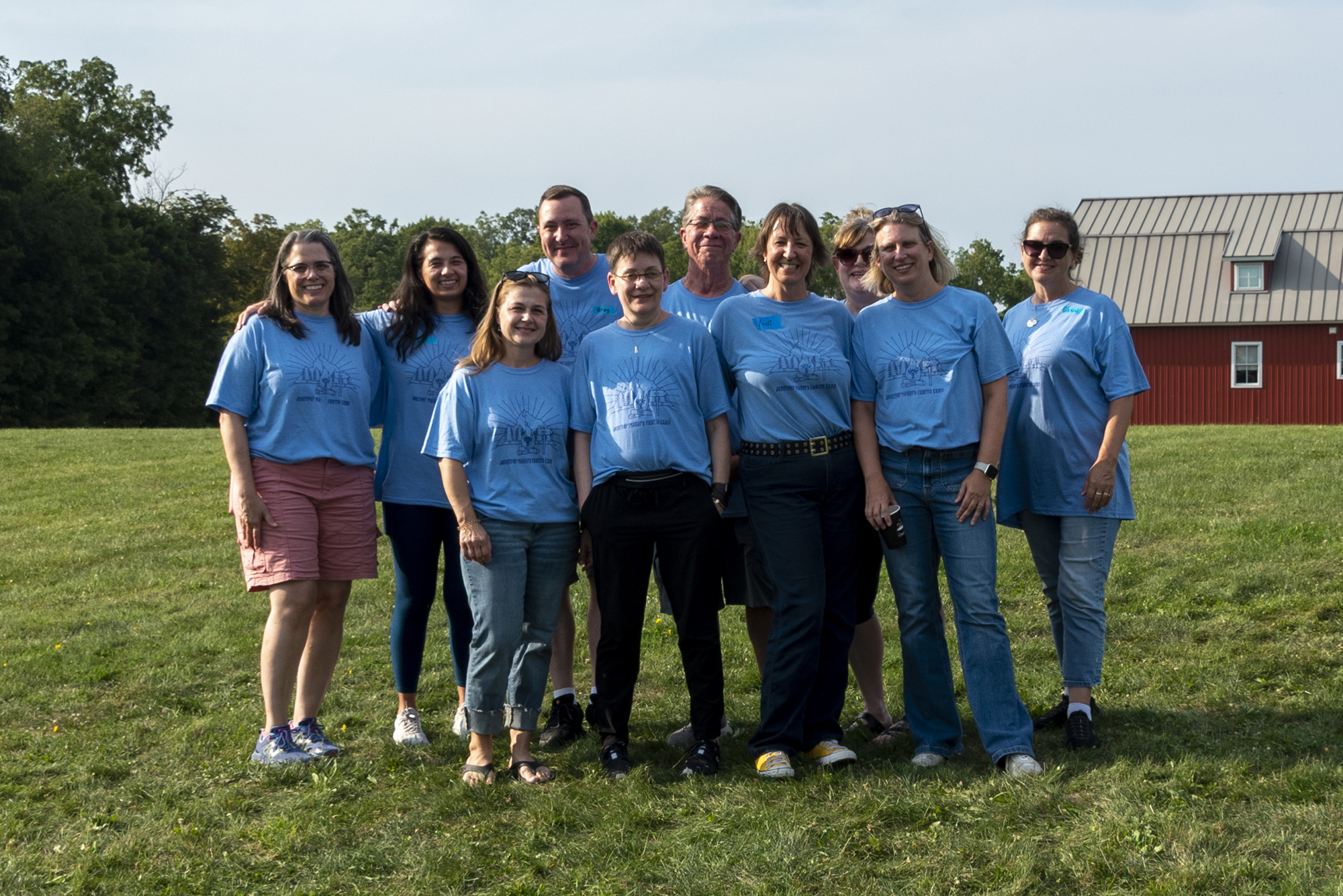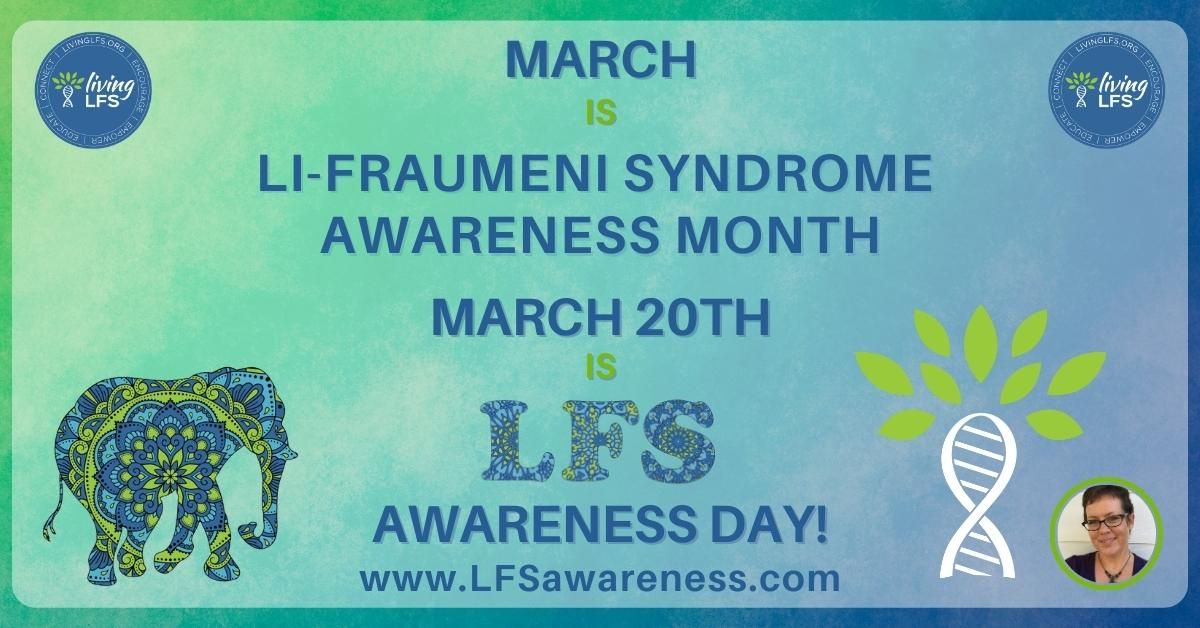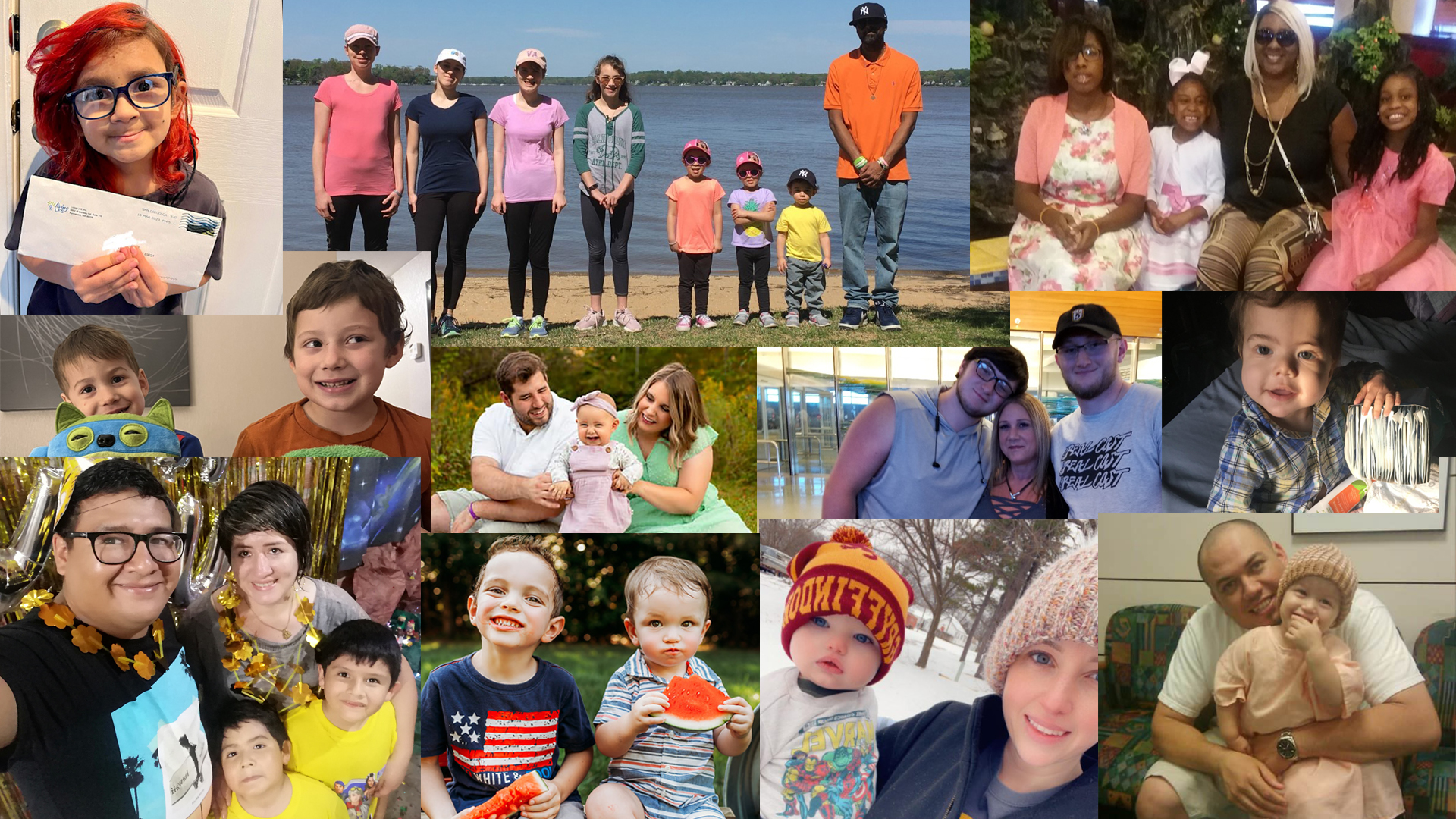Info Cards for International LFS Awareness!
We’re excited to make new resources available to spread awareness of Li-Fraumeni syndrome (LFS) on May 3, International LFS Awareness Day! We invite you to send Living LFS' informational rack card in English, Dutch, German, Portuguese, French and Spanish to your local cancer facility! Watch for the Greek version coming soon! See the full text of these informational cards at the end of this post.
Huge thanks to Living LFS Secretary Inge Vandormael for volunteering her time to translate this important reference into Dutch, German, French, and Greek! Thank you as well to volunteer Thelma for the Portuguese version, Adrià for the Spanish version, and to volunteer Maureen for the layout and design of all of our rack cards! Email hello@livinglfs.org to volunteer to translate our resources into your native language.
Why Are There Two LFS Awareness Days?
In 2021, Li-Fraumeni syndrome patient support organization Living LFS established March as LFS Awareness Month and March 20th as Li-Fraumeni Syndrome Awareness Day. March 20th was chosen to honor the birth anniversary of Living LFS founder and fierce patient advocate Jennifer Mallory (March 20, 1976 - October 5, 2020).
As part of the inaugural LFS Awareness Month activities in March 2021, Living LFS also launched the LFS Hardship Grant program, awarding money to LFS families in need every March 20 and October 5. Since the program was created, Living LFS has proudly connected those in need with over $115K in funds to help defray the significant costs that can accrue for those living with Li-Fraumeni syndrome.
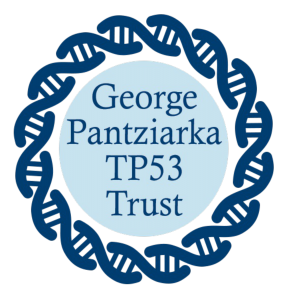
Our UK cousins at the George Pantziarka TP53 Trust joined us in spreading LFS awareness in March 2021 and we're grateful that they have marked the occasion with us each year, disseminating important information and creating the #WearBlueForLFS awareness campaign on social media.
Following the success of the first Li-Fraumeni Syndrome Awareness Day on March 20th, in 2021, the LFS Association chose May 3 as International LFS Awareness Day - 5/3 for the TP53 gene and p53 protein responsible for LFS. Living LFS is pleased to spread awareness of Li-Fraumeni syndrome and to provide support and education for the LFS patient community throughout March LFS Awareness Month, on LFS Awareness Day March 20th, on International LFS Awareness Day May 3rd, and EVERY day!

Living LFS' partners Snarky Cancer created t-shirts to acknowledge the two awareness days and to raise funds for the community. Get yours now to help Living LFS fund more hardship grants for families struggling with the costs of living with LFS.

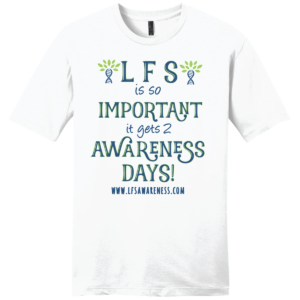
We encourage all LFS support organizations, and the entire inherited cancer community, to join us in raising awareness of Li-Fraumeni syndrome (LFS) throughout the year. Our deepest gratitude to our partners and Living LFS donors for their support! Donate today.
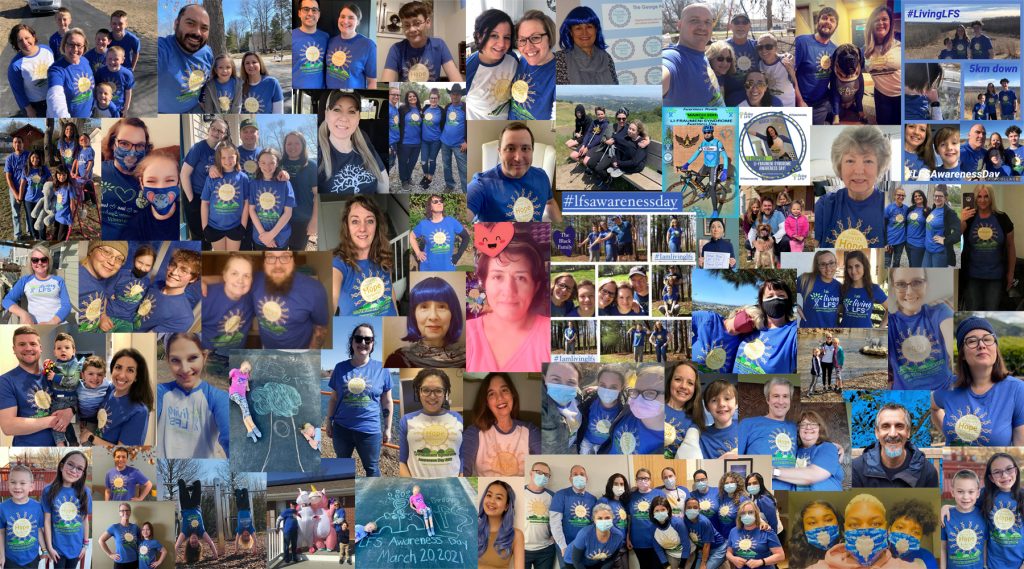
LFS Informational Rack Card: English Text
Li-Fraumeni Syndrome (LFS) is linked to a mutation in the TP53 tumor suppressor gene. There are many types of TP53 mutations. People with a TP53 mutation have a higher risk of developing cancer over their lifetime. LFS affects each individual differently, even within the same family. Some families with LFS have higher rates of cancer incidence, while others do not.
LI-FRAUMENI SYNDROME FACTS
Li-Fraumeni Syndrome does not affect one particular age, gender, or race.
50% of LFS cancers develop before the age of 30.
A woman with LFS has a 90% chance of developing cancer in her life, much of this risk is due to breast cancer.
A man with LFS has a 70% chance of developing cancer in his life.
People with LFS can develop many cancers over their lifetime.
LFS is a dominant trait. A parent with LFS has a 50% chance of passing the mutation along to their children.
The cancers most often seen in LFS are adrenal, brain, breast, leukemias, and sarcomas, but LFS cancers can occur anywhere in the body.
Certain childhood cancers are linked to LFS: Choroid Plexus Carcinoma (brain tumors), Sarcomas (including Osteosarcoma), and adrenocortical tumors.
And finally....not all people with LFS get cancer.
WHO HAS LFS?
Li-Fraumeni Syndrome might be suspected if you have a personal history of multiple cancers, a family history of cancer, or if certain cancers are seen in children or young adults in your family.
SHOULD YOU BE TESTED?
Getting tested for a familial cancer syndrome can be a daunting decision. A genetic counselor can help you weigh the risks and benefits of being tested for a TP53 mutation. Knowing whether or not you have a mutation can help you and your providers develop a personalized screening regimen designed to detect cancer at the earliest and most treatable stages. There are many varying degrees of LFS, and many people with a TP53 mutation live long, healthy lives.
Living LFS SUPPORT
At Living LFS, we encourage, empower, and educate those living with Li-Fraumeni Syndrome by connecting them with care, resources, and others who are Living LFS.
Living LFS, Inc. 637 W. Highway 50, #195 O’Fallon, IL 62269-1956. 1-844-LFS-CALL hello@LivingLFS.org LivingLFS.org
Living LFS, Inc. is a qualified 501c(3) tax-exempt organization. Donations are tax-deductible to the full extent of the law.
LFS informatieve kaart: Nederlandse tekst
Li-Fraumeni Syndroom (LFS) is gekoppeld aan een mutatie in het TP53 tumor suppressor gen. Er zijn veel soorten TP53 mutaties. Mensen met een TP53 mutatie hebben een hoger risico om kanker te ontwikkelen gedurende hun leven. LFS beïnvloedt elk individu anders, zelfs in dezelfde familie. Sommige families met LFS hebben hogere percentages van kankerincidentie, terwijl anderen dat niet hebben.
Li-Fraumeni Syndroom Feiten
Li-Fraumeni Syndroom heeft geen invloed op een bepaalde leeftijd, geslacht of ras.
50% van de LFS kankers ontwikkelen zich voor de leeftijd van 30 jaar.
Een vrouw met LFS heeft gedurende haar leven een kans van 90% om kanker te krijgen. Een groot deel van dit risico is te wijten aan borstkanker.
Een man met LFS heeft gedurende zijn leven een kans van 70% om kanker te krijgen.
Mensen met LFS kunnen tijdens hun leven verschillende kankers krijgen.
LFS is een dominante eigenschap. Een ouder met LFS heeft een kans van 50% om de mutatie door te geven aan hun kinderen.
De kankers die het vaakst worden gezien bij LFS, zijn bijnierkanker, hersenkanker, borstkanker, leukemieën, en sarcomen, maar LFS kankers kunnen overal in het lichaam voorkomen.
Bepaalde vormen van kanker bij kinderen zijn gekoppeld aan LFS: choroid plexus carcinoom (hersentumoren), sarcomen (inclusief osteosarcoom) en bijnierschors tumoren.
En tot slot… Niet iedereen met LFS krijgt kanker.
WIE HEEFT LFS?
Men kan vermoeden dat u Li-Fraumeni Syndroom heeft als u een persoonlijke geschiedenis heeft van meerdere kankers, een familiegeschiedenis van kanker, of als bepaalde vormen van kanker gezien worden bij kinderen of jongvolwassenen in uw familie.
MOET U GETEST WORDEN?
Het kan een beangstigende beslissing zijn om getest te worden voor een familiair kankersyndroom. Een genetische consulent kan u helpen met het afwegen van de risico’s en voordelen van het testen voor een TP53 mutatie. Als u weet of u al dan niet een mutatie heeft, kunnen u en uw zorgverleners een persoonlijk screening regime ontwikkelen. Zulk een screening regime is ontworpen om kanker in de vroegste en meest behandelbare stadia op te sporen. Er zijn meerdere verschillende gradaties van LFS, en veel mensen met een TP53 mutatie leven een lang en gezond leven.
Living LFS ONDERSTEUNING
Bij Living LFS moedigen we mensen aan die met het Li-Fraumeni Syndroom leven, geven hun de macht en kennis door hen in contact te brengen met zorgverlening, middelen, en lotgenoten die Living LFS zijn.
Living LFS, Inc. 637 W. Highway 50, #195 O’Fallon, IL 62269-1956. 1-844-LFS-CALL hello@LivingLFS.org LivingLFS.org
Living LFS, Inc. is een gekwalificeerde 501c(3) belastingvrije organisatie. Giften zijn fiscaal aftrekbaar in de volle omvang van de wet.
LFS Informations-Rack-Karte: Deutscher Text
Das Li-Fraumeni-Syndrom (LFS) ist mit einer Mutation im Tumorsuppressorgen TP53 verbunden. Es gibt viele Arten von TP53-Mutationen. Menschen mit einer TP53 Mutation haben ein höheres Risiko, im Laufe ihres Lebens an Krebs zu erkranken. LFS wirkt sich auf jedes Individuum unterschiedlich aus, sogar innerhalb derselben Familie. In einigen Familien mit LFS treten mehr Krebsfälle auf, in anderen nicht.
Li-Fraumeni-Syndrom Fakten
Das Li-Fraumeni-Syndrom ist nicht auf ein bestimmtes Alter, Geschlecht oder eine bestimmte Rasse beschränkt.
50 % der LFS-Krebsfälle treten vor dem 30. Lebensjahr auf.
Eine Frau mit LFS hat eine 90-prozentige Chance, im Laufe ihres Lebens an Krebs zu erkranken, wobei ein Großteil dieses Risikos auf Brustkrebs zurückzuführen ist.
Ein Mann mit LFS hat eine 70-prozentige Chance, im Laufe seines Lebens an Krebs zu erkranken.
Menschen mit LFS können im Laufe ihres Lebens viele Krebsarten entwickeln.
LFS ist eine dominante Veranlagung. Ein Elternteil mit LFS hat eine 50%ige Chance, die Mutation an seine Kinder weiterzugeben.
Die bei LFS am häufigsten auftretenden Krebsarten sind Nebennieren-, Hirn-, Brust-, Leukämie- und Sarkom Krebs, aber LFS-Krebs kann überall im Körper auftreten.
Bestimmte Krebsarten im Kindesalter sind mit LFS verbunden: Choroid Plexus Karzinom (Gehirntumore), Sarkome (einschließlich Osteosarkome) und Nebennierentumore.
Und schließlich.... nicht alle Menschen mit LFS Krebs bekommen.
Wer hat LFS?
Der Verdacht auf das Li-Fraumeni-Syndrom kann sich ergeben, wenn in Ihrer persönlichen Vorgeschichte mehrere Krebserkrankungen aufgetreten sind, wenn es in Ihrer Familie Krebserkrankungen gibt oder wenn bestimmte Krebsarten bei Kindern oder jungen Erwachsenen in Ihrer Familie vorkommen.
Sollten Sie sich testen lassen?
Sich auf ein familiäres Krebssyndrom testen zu lassen, kann eine entmutigende Entscheidung sein. Ein genetischer Berater kann Ihnen helfen, die Risiken und Vorteile eines Tests auf eine TP53-Mutation abzuwägen. Wenn Sie wissen, ob Sie eine Mutation haben oder nicht, können Sie und Ihr Arzt ein individuelles Vorsorgeprogramm entwickeln, um Krebs in den frühesten und am besten behandelbaren Stadien zu erkennen. Es gibt viele verschiedene Grade von LFS, und viele Menschen mit einer TP53-Mutation leben ein langes, gesundes Leben.
Living LFS Unterstützung
Living LFS ermutigt, stärkt und informiert Menschen, die mit dem Li-Fraumeni-Syndrom leben, indem wir sie mit Pflege, Ressourcen und anderen, die mit LFS leben, in Kontakt bringen.
Living LFS, Inc. 637 W. Highway 50, #195 O’Fallon, IL 62269-1956. 1-844-LFS-CALL hello@LivingLFS.org LivingLFS.org
Living LFS, Inc. ist eine qualifizierte 501c(3) steuerbefreite Organisation. Spenden sind im vollen Umfang des Gesetzes steuerlich absetzbar.
SLF Informativo Rack Card: Texto em Português
A síndrome de Li-Fraumeni (SLF) está ligada a uma mutação no gene TP53, supressor de tumores. Existem muitos tipos de mutações neste gene. Pessoas com mutação no TP53 têm um maior risco de desenvolver câncer ao longo da vida. A SLF afeta cada pessoa de forma diferente, mesmo dentro da mesma família. Algumas famílias com SLF têm taxas mais altas de incidência de câncer, enquanto outras não.
Fatos sobre a Síndrome de Li-Fraumeni
A Síndrome de Li-Fraumeni não afeta determinada idade, sexo ou raça.
50% dos cânceres em SLF se desenvolvem antes dos 30 anos.
Uma mulher com SLF tem 90% de chance de desenvolver câncer em sua vida, o risco mais alto é o de desenvolver câncer de mama.
Homens com SLF tem 70% de chance de desenvolver câncer ao longo da vida.
Pessoas com SLF podem ou não desenvolver vários cânceres ao longo da vida.
A SLF é uma característica hereditária dominante. Se o pai ou a mãe tem SLF, existe 50% de chance de passar a mutação para os seus filhos.
Os cânceres mais frequentemente vistos em LFS são das adrenais, cerebrais, de mama, leucemias e sarcomas, mas os cânceres causados pela SLF podem ocorrer em qualquer parte do corpo.
Certos cânceres infantis são ligados à SLF: Carcinoma de Plexo Coróide (tumores cerebrais), Sarcomas (incluindo osteossarcoma) e tumores adrenocorticais.
E finalmente… nem todas as pessoas com SLF desenvolvem câncer.
QUEM TEM LFS?
A síndrome de Li-Fraumeni pode ser uma suspeita se você tem um histórico pessoal de câncer, ou histórico familiar de cânceres, ainda, se certos tipos de câncer tiverem sido diagnosticados em crianças ou jovens em sua família.
QUEM DEVE FAZER O TESTE GENETICO?
Fazer o teste para detecção de uma síndrome de câncer familiar pode ser uma decisão assustadora. Um geneticista pode ajudar você a analisar os riscos e benefícios de ser testado para uma mutação no TP53.
Saber se você tem ou não uma mutação pode ajudar você e seus médicos a desenvolver um protocolo personalizado de exames que é projetado para detectar câncer nos estágios iniciais e com maiores chances de tratamento.
Existem variados graus de SLF e muitas pessoas com a mutação no TP53 vivem vidas longas e saudáveis.
LIVING LFS APOIAR
Nós do Living LFS, encorajamos, capacitamos e educamos aqueles que vivem com a Síndrome de Li- Fraumeni conectando-os com médicos, fontes de informação e outros pacientes que vivem com a SLF.
Living LFS, Inc. 637 W. Highway 50, #195 O’Fallon, IL 62269-1956. 1-844-LFS-CALL hello@LivingLFS.org LivingLFS.org
A Living LFS, Inc. é uma organização qualificada para isenção de impostos 501c(3). Doações são dedutíveis de impostos em toda a extensão da lei.
Tarjeta Informativa SLF: Texto en Español
El síndrome de Li-Fraumeni (SLF) se relaciona con alteraciones en el gen supresor de
tumores TP53. Hay muchos tipos de alteraciones. Las personas con alteraciones en el
gen TP53 tiene más riesgo de desarrollar cáncer a lo largo de la vida. El SLF afecta a
cada persona de manera diferente, incluso en la misma familia. Algunas familias con
SLF tienen alta incidencia de cáncer mientras que otras no.
DATOS CLAVE DEL SÍNDROME DE LI-FRAUMENI
- El síndrome de Li-Fraumeni no afecta a una edad, género o etnia determinados
- El 50% de los tumores asociados a SLF se desarrollan antes de los 30 años
- Una mujer con SLF tiene una probabilidad del 90% de desarrollar cáncer de
mama a lo largo de la vida, este riesgo se debe principalmente al cáncer de
mama - Un hombre con SLF tiene un 70% de probabilidad de desarrollar cáncer en su
vida - Las personas con LFS pueden desarrollar varios tumores a lo largo de la vida
- El SLF es un síndrome dominante, por lo que una persona con SLF tiene un
50% de probabilidad de trasmitir el cambio a cada uno de sus hijos/as. - Los tumores más frecuentemente observados en el SLF son: de glándula
suprarrenal, cerebro, mama, leucemias y sarcomas, pero los tumores pueden
aparecer en cualquier parte del cuerpo. - Algunos tumores infantiles se pueden relacionar con el SLF: carcinoma de
plexos coroideos (tumor cerebral), sarcomas (incluyendo osteosarcomas) y
tumores de la glándula suprarrenal.
Y finalmente… no todas las personas con SLF desarrollan cáncer
¿QUIÉN TIENE SLF?
El síndrome de Li-Fraumeni se puede sospechar en caso de tener una historia
personal de múltiples tumores, una historia familiar con cáncer o si aparecen
determinados tumores en la infancia o la adolescencia.
¿DEBERÍA HACERME UN ESTUDIO GENÉTICO?
Realizar un estudio genético de susceptibilidad al cáncer puede ser una decisión
angustiosa. Un asesor genético puede ayudarle a sopesar los riesgos y beneficios de
llevar a cabo el estudio genético de TP53. Saber si tiene una alteración en el gen TP53 puede ayudarle a usted y a su equipo médico a iniciar un programa de seguimiento
personalizado con el objetivo de identificar posibles tumores en estadios precoces y
tratables. Hay varios grados de SLF y muchas personas con una alteración en TP53
tienen vidas largas y saludables.
SOPORTE a Living LFS
En Living LFS, animamos, empoderamos y educamos aquellas personas que viven
con el síndrome de Li-Fraumeni conectándolas con los recursos sanitarios y con otras
personas que también los vives.
Living LFS, Inc. 637 W. Highway 50, #195 O’Fallon, IL 62269-1956. 1-844-LFS-CALL hello@LivingLFS.org LivingLFS.org
Living LFS, Inc. es una organización calificada 501c(3) exenta de impuestos. Las donaciones son deducibles de impuestos hasta el máximo permitido por la ley.
